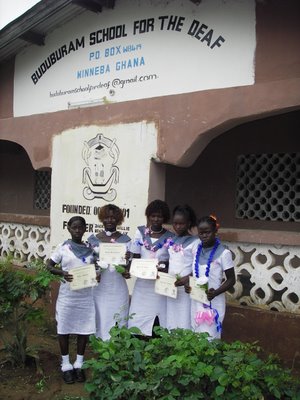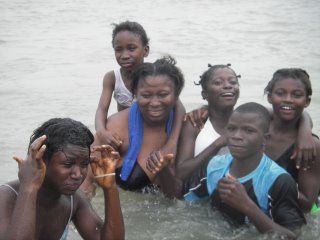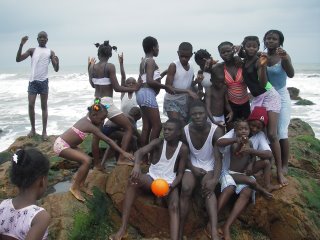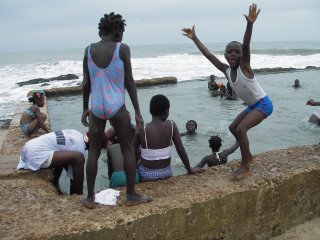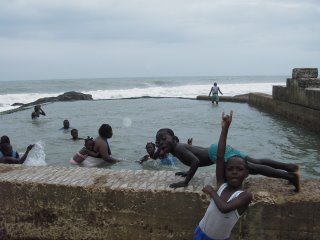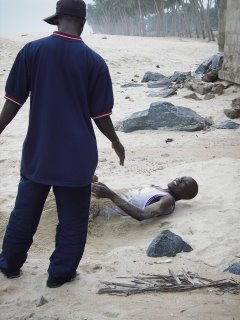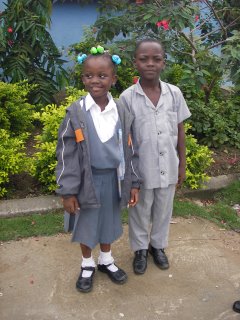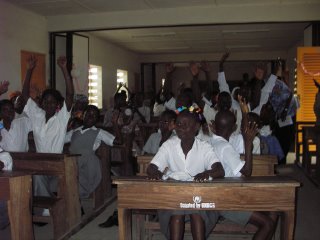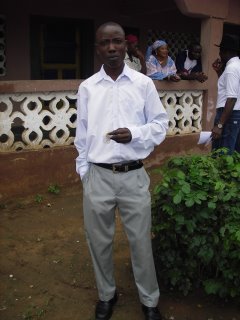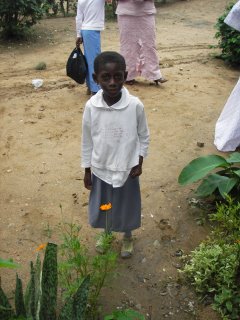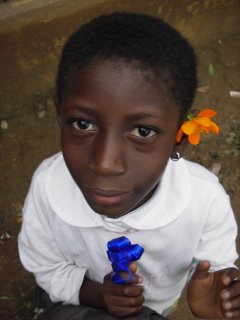In the war, Morris had been beaten and, as a result, lost most of his hearing. I met him about a year and a half ago, and following audiological assessment, it was determined that a hearing aid would not help him. He had at one time been a karate instructor – and PE (physical education) was something we needed to develop at the school. So, for the past year, Morris has been instructing our PE classes and learning sign language. He’s always been positive, upbeat, cheerful – and always with a great, beautiful smile.
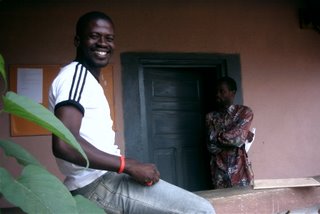
Morris was also in the resettlement program – a program through UNHCR that resettles refugees to different countries for various reasons related to safety, family, etc. Every day people check the list of names posted near the UNHCR office, hoping to see that their name has come up for resettlement. Morris’ name was posted in February – and he began the process leading to resettlement to Australia. In May he was finally in the last stage, doing his final physical evaluation, when it was observed that there was some problem with his lungs. (He’s the one I’ve mentioned in the past who was in the hospital with pleural effusion.) He was immediately taken to the hospital where he stayed for 2 months, with fluid draining through a tube coming out of a hole that had been drilled into his chest.
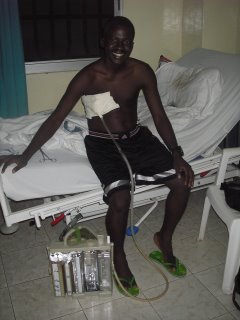 Since the fluid was continuing to drain even after those 2 months, the doctors determined that surgery would be necessary. But delays came. And after another 3 weeks the doctors entered his room, removed the tube and told him that they would be discharging him – the IOM didn’t agree to the surgery.
Since the fluid was continuing to drain even after those 2 months, the doctors determined that surgery would be necessary. But delays came. And after another 3 weeks the doctors entered his room, removed the tube and told him that they would be discharging him – the IOM didn’t agree to the surgery.The IOM – the International Organization for Migration – is responsible for the interviewing and preparation of refugees for resettlement. They interviewed Morris, chose him for resettlement to Australia, paid his hospital bills for almost 3 months, and then inexplicably discharged him. After finally being discharged, he went to the IOM office and the woman in charge of his case was on break. No one else was left in charge, apparently. He got the run-around.
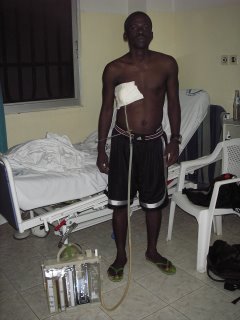
Morris is pretty much alone on the camp and it’s not easy to communicate with him – he doesn’t hear at all clearly and his speaking is also difficult to understand. Fortunately, he can read and write very well, so if the person talking with him is willing to take the time, it’s possible to communicate very effectively. However, the doctors didn’t take time. IOM representatives didn’t take time. No one who knew would take time. So for 3 months Morris didn’t know the details of his condition, prognosis, reasons for treatments, etc.
When he was discharged, the doctors weren’t happy. But they gave him some prescriptions that IOM said they would fill. The IOM person to do the filling misplaced the prescription and forgot receiving it. Morris got another prescription, was again told the medicine would be brought to him, was back on the camp for a couple of weeks and still hadn’t received his medicines. The hole in his chest was still leaking, he was becoming thinner and more depressed. He had no energy and had lost his positive spirit, the gleam in his eyes and the big, beautiful smile.
Some of the students visiting Morris in the hospital

I encouraged him to go to the IOM office again – we’d heard that the woman in charge of his case was supposed to be back. I encouraged him to write a brief history of his situation to leave with the woman in charge of his case. I encouraged him to take someone with him – a friend, someone to help represent him, to be strong, to stand by his side, to hear for him, to help speak for him, and to support him in not being pushed back out the door and told to come back.
In 16 years on the camp, the refugees have no strong representation. There’s a Welfare Council, but they were appointed by the Camp Commander and are basically ineffective and looking out for themselves (or so everyone on the camp I asked about this tells me). There’s no one representing the refugees to the UNHCR or to the IOM; no one who knows their rights and has a strong, respected voice; no one putting the needs and rights of people they should be representing before their own personal gains and ambitions; no one with the courage to stand up and speak out.
IOM has been known to put these kinds of cases off, to keep stringing along some of these cases. It’s also been observed in the past that if someone else, like a missionary or some other organization, gets involved with a case, that this may even make it easier to put the case off. After all, the missionary or other organization is taking care of the needs, buying the medicine, taking the person from doctor to doctor and hospital to hospital.
So I’m careful about my involvement with Morris’ case.
I try to advise him; I edited, typed and printed his letter; I made arrangements with the clinic on the camp to change the dressings for the hole in his chest, so that he wouldn’t need to travel to the hospital in Accra every 2 days; I help him with some upkeep money (since he can no longer work) and transportation expenses; I sit and talk (write back and forth) with him. But I stay in the background. I don’t go to the IOM office. I don’t talk to or push the doctors at the main hospital where he was. We all fear that if they see me (a missionary, a foreigner) involved, it could only complicate things and delay his case. They will think that now someone else can pick up their slack, buy the medicines, pay for the operation.
Last week Morris went back to the IOM to see the woman in charge of his case. He took the letter and a friend with him – someone who was able to help hear and speak and stand strong. The secretary did her job and told them the woman in charge was in a meeting and wouldn’t be available until later and they should come back the next day. They said they’d wait. After some time the secretary told them they could leave the letter. They told her they would continue to wait. Finally, after 1 ½ hours of public transport and over 5 hours of waiting, Morris (who was coming from the hospital with a hole in his chest after a 3 month stay, who for three weeks did not have the medicines he was told he needed and that the IOM had promised to provide, who had lost his energy and spirit and beautiful smile) stepped out for some fresh air and saw Vicki, the woman in charge of his case. She was escorting someone to his car. Vicki saw Morris and had no choice but to give him a chance to talk. She made promises that she was following up with Australia about his case. And she sent him away with these promises and the medicine he had been prescribed.
I never know. Should I stay in the background, advising, encouraging? Or should I become more of a voice for Morris? Should I go to Vicki’s office every day and push push push? Should I go to the Welfare Council on the camp and demand they do their job? Should I be more active in the foreground – find out all his rights, go to IOM offices and represent him? Should I take the case to Amnesty International (as someone suggested I do)?
The problem is, Morris is not the only case like this. There have been and still are others being shuffled and pushed around. And the other frustrating part – why does that go on? over and over? with no one becoming that needed voice? The voice needs to come from within – from the Liberians – if it’s to be effective. And for 16 years the voice has not been found.
Last week Morris went back to the IOM to see the woman in charge of his case. He took the letter and a friend with him – someone who was able to help hear and speak and stand strong. The secretary did her job and told them the woman in charge was in a meeting and wouldn’t be available until later and they should come back the next day. They said they’d wait. After some time the secretary told them they could leave the letter. They told her they would continue to wait. Finally, after 1 ½ hours of public transport and over 5 hours of waiting, Morris (who was coming from the hospital with a hole in his chest after a 3 month stay, who for three weeks did not have the medicines he was told he needed and that the IOM had promised to provide, who had lost his energy and spirit and beautiful smile) stepped out for some fresh air and saw Vicki, the woman in charge of his case. She was escorting someone to his car. Vicki saw Morris and had no choice but to give him a chance to talk. She made promises that she was following up with Australia about his case. And she sent him away with these promises and the medicine he had been prescribed.
I never know. Should I stay in the background, advising, encouraging? Or should I become more of a voice for Morris? Should I go to Vicki’s office every day and push push push? Should I go to the Welfare Council on the camp and demand they do their job? Should I be more active in the foreground – find out all his rights, go to IOM offices and represent him? Should I take the case to Amnesty International (as someone suggested I do)?
The problem is, Morris is not the only case like this. There have been and still are others being shuffled and pushed around. And the other frustrating part – why does that go on? over and over? with no one becoming that needed voice? The voice needs to come from within – from the Liberians – if it’s to be effective. And for 16 years the voice has not been found.

